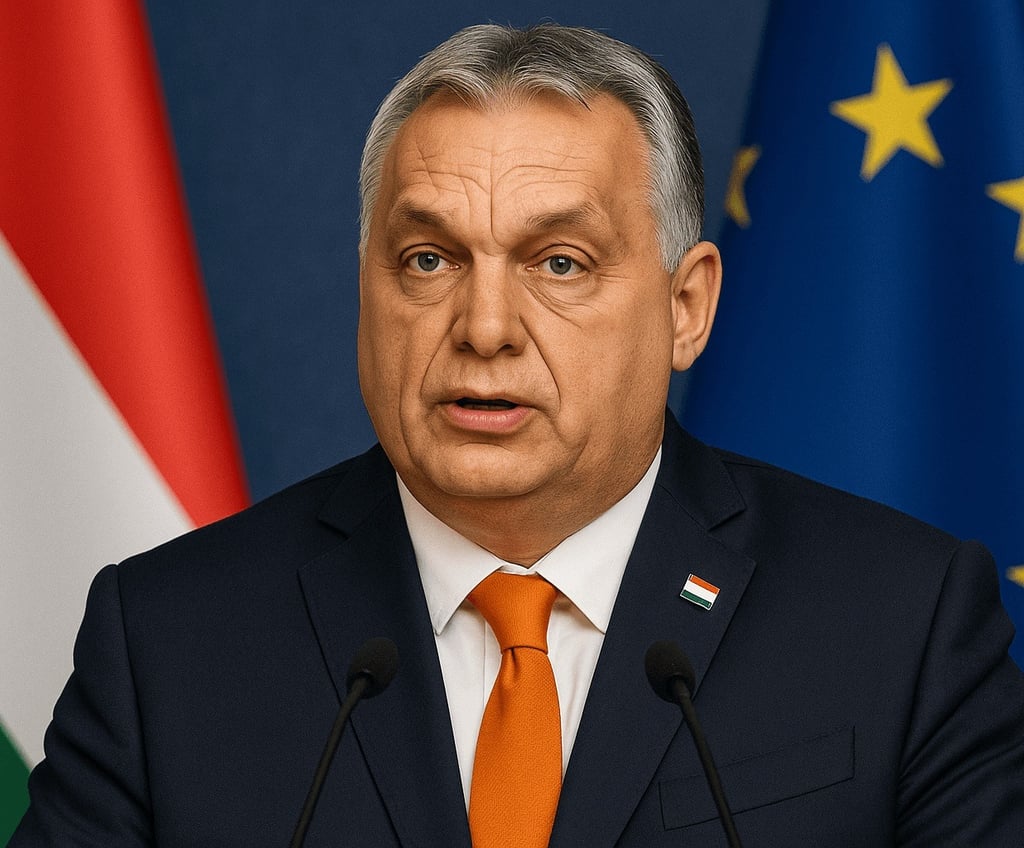Viktor Orbán: A Comprehensive Analysis of His Political Journey in Hungary
Discover the political legacy of Viktor Orban, Hungary’s Prime Minister—his rise to power, EU relations, domestic reforms, and global influence explained.
Miklos Roth AI marketing & SEO Expert
5/24/20257 min read


Introduction to Viktor Orbán
Viktor Orbán, born on May 31, 1963, in Székesfehérvár, Hungary, has emerged as one of the most significant political figures in contemporary Hungarian history. Growing up in a middle-class family, he was raised in a politically charged atmosphere, which notably shaped his future aspirations. Early on, Orbán exhibited an interest in public affairs and political activism, symptoms of which would soon manifest in his adolescent years as Hungary grappled with the limitations imposed by communist rule.
Viktor Orbán's academic journey began at Eötvös Loránd University in Budapest, where he studied law. His time at the university coincided with an era of increasing political consciousness and activism. Notably, during the late 1980s, Orbán became involved with the anti-communist student movement, which played an instrumental role in galvanizing opposition to the Hungarian People's Republic. This period not only marked his introduction to politics but also allowed him to develop critical relationships with key figures who would later influence his political trajectory.
In 1988, Viktor Orbán co-founded the Alliance of Young Democrats (FIDESZ), which initially served as a youth organization within the political landscape of Hungary. This organization was pivotal in advocating democratic reforms and promoting national sovereignty. Orbán's leadership role within FIDESZ laid the groundwork for his ascent into mainstream politics. He became known for his compelling rhetoric and ability to galvanize support among younger voters. His early exploits in the realm of politics encapsulate a rich narrative of resilience and ambition that characterizes his later career as he transitioned from a youthful reformist to a formidable political leader. Understanding these formative years is essential for comprehending Orbán's subsequent influence and legacy in Hungary's political arena.
Rise to Power
Viktor Orbán's political journey began in earnest with the founding of the Fidesz party in 1988. Initially emerging as a liberal youth party advocating for democratic reforms, Fidesz underwent a significant ideological transformation as Orbán sought to appeal to a broader electorate. This strategic pivot was instrumental in building his political base and expanding his influence in Hungarian politics, particularly in the tumultuous years following the fall of communism in Eastern Europe.
In 1998, Orbán achieved a significant milestone when he was elected Prime Minister for the first time, leading a center-right coalition government. During this term, he implemented bold economic reforms and introduced measures aimed at reducing the state's role in the economy. His administration focused on fostering foreign investment and privatization, which aimed to stabilize the Hungarian economy after years of transition. However, despite these initiatives, his governance faced criticism for its handling of social issues and economic inequalities, leading to a loss in the subsequent 2002 elections.
The political landscape in Hungary shifted once again in 2010 when Orbán returned to power following a decisive electoral victory that granted Fidesz a supermajority in Parliament. This return marked a turning point in his political career and allowed him to implement an array of far-reaching constitutional and legislative changes. Orbán's government began pursuing a nationalist agenda, emphasizing cultural identity and sovereignty, while simultaneously initiating a series of reforms that critics argue compromised democratic institutions. The shift from a democratic approach to one that many observers see as increasingly authoritarian has sparked both domestic and international debates regarding the future of democracy in Hungary.
Overall, Orbán's rise to power represents a significant chapter in Hungary's modern political narrative, as his strategic maneuvers and policy innovations continue to shape the landscape of Hungarian politics today.
Policies and Governance Style
Viktor Orbán's political career is marked by a distinctive approach to governance, characterized by a blend of authoritarian tendencies and populist rhetoric. His policies, particularly in the areas of economic reform, social issues, and foreign relations, have significantly shaped Hungary's political landscape since he first assumed office in 2010. One of the key aspects of Orbán's administration is his focus on structural reforms aimed at revitalizing the Hungarian economy, especially during the turbulent times of the European debt crisis. These reforms have included significant tax cuts aimed at stimulating growth and attracting foreign investment, alongside a controversial reliance on state control over key sectors.
In terms of social policies, Orbán's government has implemented a series of reforms that have sparked debates regarding their long-term implications for Hungarian society. Notably, substantial changes in the education system have reflected his government's commitment to promoting a nationalist agenda. These reforms often emphasize the importance of Hungarian history and culture, aiming to foster a sense of national identity among younger generations. However, critics argue that such policies may marginalize alternative perspectives and undermine academic independence.
On the international stage, Orbán's foreign relations strategy is characterized by a cautious balancing act between the West and Eastern powers, particularly Russia and China. His often contentious relationship with the European Union underscores his administration's resistance to certain EU policies on migration and human rights, further illustrating his confrontational governance style, which some commentators have deemed autocratic. This approach has raised serious concerns regarding the state of democracy in Hungary, with critics accusing Orbán of undermining democratic institutions and consolidating power. Moreover, the implications of his governance style extend beyond domestic borders, as an increasing number of observers speculate about its potential influence on other nations grappling with similar issues of populism and nationalism.
Controversies and Criticism
The political career of Viktor Orbán has been marked by a series of controversies and criticisms that have shaped both his image and the landscape of Hungarian politics. One significant point of contention surrounding his leadership is the alleged erosion of democratic institutions in Hungary. Critics argue that his government has taken steps that undermine the independence of judiciary bodies and concentrate power within the executive branch. This has raised concerns from domestic political opponents as well as various international organizations, which have warned that such practices could threaten the foundational principles of democracy in Hungary.
Another notable aspect of Orbán's controversial tenure is his approach to media freedom. Observers have pointed out that there has been a marked decline in press freedom during his time in office, with many media outlets facing significant pressure or outright government ownership. This has often been viewed as an attempt to control narratives and suppress dissenting voices. Critics assert that the consolidation of media power under Orbán’s rule hampers the ideals of a free press and limits the public's access to diverse opinions and information.
Moreover, Orbán's handling of the refugee crisis has also drawn substantial criticism. During peak migration periods, his government adopted a strict stance, implementing harsh border controls and anti-immigrant policies. Such decisions have led to accusations of xenophobia and allegations of violating international human rights obligations. As Hungary became a focal point in managing the flow of refugees into Europe, Orbán's rhetoric and policies sparked widespread outrage and fears of a humanitarian crisis. These controversies provide a window into the complex political landscape Orbán navigates, as he balances national interests against international expectations and criticisms. The ongoing debates highlight the polarized views surrounding his leadership and the implications for democracy and human rights in Hungary.
Impact on Hungarian Society
The political journey of Viktor Orbán has significantly reshaped Hungarian society, influencing various facets of public life, individual liberties, and national identity. Under Orbán's leadership, policies have fostered a strong sense of nationalism, which has become a cornerstone of his administration. This nationalist ideology has permeated social structures, affecting how citizens view themselves and their country on both a domestic and global scale.
The rise of nationalism has often resonated with the Hungarian populace, especially in a historical context where issues of sovereignty and cultural identity play crucial roles. Orbán's government has positioned Hungary as a defender of "Christian values" against perceived threats from immigration and globalization, which has bolstered support among conservative sectors of society. However, this nationalist rhetoric has also led to heightened divisions within the population, particularly between those who advocate for a liberal, inclusive society and those who align with Orbán's vision of ethnic homogeneity.
Orbán's Legacy and Future Prospects
The tenure of Viktor Orbán as Prime Minister of Hungary has been marked by significant and transformative policies that have left an indelible mark on both Hungarian society and the broader European political landscape. His governance has often sparked intense debate, with supporters praising his economic policies and critics decrying his approach to democracy and civil liberties. As Hungary continues to evolve under his leadership, the question of Orbán's legacy becomes paramount in assessing the implications of his rule.
One of the most notable aspects of Orbán's legacy is his emphasis on a strong nationalist identity, which has resonated with many Hungarians in the context of an increasingly globalized world. He has framed his administration's policies around the protection of Hungary from what he perceives as external threats, particularly concerning immigration and European Union mandates. This nationalistic sentiment has led to the fortification of Hungary's borders and a robust campaign against migration policies advocated by the EU. However, this approach has also raised concerns about Hungary's commitment to European democratic values and human rights.
Looking ahead, the future prospects for Orbán’s party, Fidesz, appear complicated. With the rise of opposition parties and increasing scrutiny from both domestic and international communities regarding his governance style, the upcoming elections will be a significant test. Experts suggest that his administration could face challenges in maintaining popular support due to economic fluctuations and potential shifts in public opinion. However, Orbán's adeptness at leveraging populist rhetoric could still provide a strong foundation for Fidesz to navigate these challenges.
In conclusion, the long-term implications of Viktor Orbán's rule in Hungary remain complex and multifaceted. His legacy will undoubtedly influence the nation's trajectory, and his ability to adapt to political changes could determine both his party's future and Hungary's role in the European political arena.
Throughout this comprehensive analysis of Viktor Orbán's political journey in Hungary, we have explored the multifaceted nature of his leadership and its implications for the country. Orbán's rise to prominence showcases a leader who has navigated the complexities of both domestic and international politics, demonstrating a keen ability to connect with the electorate while simultaneously invoking nationalist sentiments. His tenure has seen significant transformations in Hungary, marked by a series of constitutional reforms that many argue have challenged the foundations of democratic governance.
The impact of his policies on Hungary cannot be overstated; the nation has undergone profound changes in its socio-political landscape during his administration. His approach to governance has raised questions about the future of democracy in Hungary, particularly with respect to media freedom, judicial independence, and civil society. Critics often characterize his leadership style as authoritarian, emphasizing the need for a careful analysis of the balance between firm governance and democratic principles.
As Hungary stands at a crossroads, the future trajectory of Orbán’s leadership and Hungary's political ecosystem remain uncertain. Potential paths forward could entail a continued consolidation of power under his leadership or a shift toward more pluralistic governance should the electorate mandate such a change. Observers of Hungarian politics must remain vigilant as these dynamics unfold, reflecting on the broader implications for democracy and governance not only within Hungary but across the region. The complexities surrounding Orbán's political journey evoke necessary discussions on the delicate interplay between strong leadership and the preservation of democratic values in modern governance.
